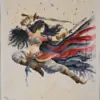A hypothesis
Main reason for Karna's devotion to Duryodhana was his need for recognition. The Pandavas and the Kuru elders rejected him because of his low birth. Karna's rivalry and jealousy towards Arjun is described as a result of this social exclusion. Arjun embodied everything that Karna was denied. Status, legitimacy and respect. The burning desire to outshine Arjun became the driving force behind Karna's actions and his alliance with Duryodhana.
Karna was driven by his jealousy of Arjun and by the constant reminder of his low birth. Drona had denied him the knowledge of Brahmastra. He reserved this for Arjun, whom he regarded as his best disciple. This later prompted Karna to secure an education from Parashurama under false pretenses. Duryodhana's support from Karna has little to do with dharma. It is based on his need for self-affirmation and self-expression. Duryodhana's acceptance is the only source of Karna's self-worth.
Karna's disobedience to his parents and Krishna after revealing his true heritage shows that his loyalty was linked to his pychological need for Duryodhana's approval and his emotional guilt. Even if this favored adharma. Duryodhana befriended Karna not just out of genuine camaraderie. He saw in Karna a powerful ally in the fight against Arjun and the Pandavas. By making Karna king of Anga and elevating him to royal status, he could use Karna's abilities to challenge Arjun. Duryodhana's intentions were self-serving. He wanted to weaken the Pandavas and retain power. Karna was his tool in this endeavor. In his quest for recognition and his jealousy of Arjun, Karna became blind to everything else.
In the battle with the Gandharvas, his loyalty was tested when he fled the battlefield. He left Duryodhana behind, who was subsequently captured. Here, Karna's instinct for self-preservation had triumphed over his loyalty to Duryodhana.
Karna's loyalty to Duryodhana was a complicated relationship between psychological needs, a bruised ego and a desperate need for status and recognition. It can be said that Karna is a tragic figure whose virtues and weaknesses are inextricably linked. The rejection of his parents' and Krishna's pleas led to questionable actions.
His loyalty to Duryodhana is self-serving and based on his unresolved inner conflict rather than genuine selfless friendship or adherence to dharma. The stain of his ‘low birth’ had a profound effect on Karna. The possibility of defeating Arjun and being accepted by Duryodhana satisfied his need for recognition and belonging.
Duryodhana was guided by strategic thinking. To gain a strong ally against the Pandavas, he exploited Karna's emotional weaknesses. His appointment as the king of Anga was not an act of pure friendship. Rather a political ploy. Though Duryodhana's friendship with Karna was also sincere, it was always tainted by ambition and self-interest. He manipulated Karna's need for recognition to bind him to himself. Thus, their relationship is characterized by mutual dependence and toxicity. Their relationship is a business, as can be seen in the Gandharva episode. In distress, ambition and self-preservation take precedence over friendship.
Karna is often seen as the ideal tragic hero. His quest for recognition blinded him to the moral consequences of supporting Duryodhana's cause. He felt indebted to Duryodhana and was torn between morality and his obligations as a friend.
The stain of his low birth shaped his resentment, jealousy, ambition and need to prove himself. All this fueled his bitterness. Moments of his selflessness evoke sympathy. Some describe him as a dark hero who embodies the struggle between personal honor, loyalty and righteousness as well as the consequences of bad decisions. He can be seen as both a tragic hero and a jealous, despicable human being. It all depends on your point of view.
Edited by So-So - 8 months ago


































